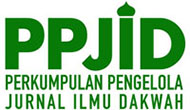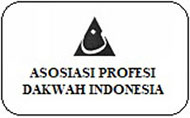Paradoks Komunikasi-Dakwah Fundamentalis Salafi: Kasus Masjid Nurul Jam’iyah Jambi (The Salafi Fundamentalist Communication-Dakwah Paradox: The Case of The Nurul Jam'iyah Mosque in Jambi)
Abstract
This article aims to analyze the dawa-communication paradoxes of the salafi-fundamentalits by questioning of what is the da’wah form of salafi-fundamentalist, so it is often labeled as intolerant and the term of fundamentalism is accused of being negative? The study focuses on the case of Masjid Nurul Jami’yyah, Jambi. By using qualitative research conducted with interview, observation and documentation, this paper concludes that da’wah of the salafi group is strickly and rigidly done. They are using the top-down communication approach as a seculer model of communication that tend to force da’wah recipients, and ignoiring the Islamic communication model emphasizing egalitarianism and two ways communication giving the recipient the freedom to accept or reject the da’wah message. The paradox of the salafi dawah lies not in the character or substansce of fundamentalism that they stand for, but in the way of da’wa-communication they use. The term of fundamentalism has absolutely no problem in a person’s religious context. Conversely, improper preaching can make the term fundamentalism being negative.
Keywords
Full Text:
PDFReferences
Asy’ari, Su’aidi. (2013). Managing Islamic public space responses of Sumantran Malay muslims toward neo-anti bid’ah movement. Journal of Indonesian Islam, 7 (2), 1-20.
Armbrost, Andereas. (2019). A profile of religion fundamentalism and terrorist activism. Defence Against Terrorism Review, 2 (1).
Al-Maraghi, Ahmad Mustafa. (1998). Tafsir al-maraghi. Mesr: Dar al-Fikr.
Appleby, R. Scott. (2000). The ambivalence of the secred religion: religion, violance and reconciliation. New York: Cernegia Corporation.
Bangstad, Sindre & Ling, Marius. (2015). Daʿwa is Our Identity’-Salafism and IslamNet’s Rationales for Action in a Norwegian Context. Journal of Muslims in Europe, 1-23. Doi 10.1163/22117954-12341307. Diakses dari https://www.researchgate.net/publication/282148353_'Da'wa_is_Our_Identity'-_Salafism_and_IslamNet's_Rationales_For_Action_in_a_Norwegian_Context' [accessed Mar 05 2020].
Barkun, Michael. (2004). Religious violance and the myth of fundamentalism. Dalam Religious fundamentalism and political extremism, Leonard Weinberg dan Amin Pedazur, eds. London; Frank Cass Publisher.
Bar, Shmuel. (2008). The religious sources of Islamic terrorism. Dalam The theory and practice of Islamic terrorism an anthropology, Marvin Perry dan Howard E. Negrin (eds.). New York: Palgrave Macmillan.
Bakti, Andi Faisal. (2000). Major conflicts in Indonesia: How can communication contribute to a solution. Review of Human Factor Studies, 6 (2), 21-40.
Bakti, Andi Faisal. (2011). Unity in diversity among muslims in the Malay world: literary works as seen from the perspective of communication. Rainbows of Malay Literature and Beyond, 45-80.
Boubekeur, Amel. (2008). Salafism and Radical Politics in Postconflict Algeria, Carnegie Endowment for International Peace. 1779 Massachusetts Avenue, NW.
Branston, Gill & Stafford, Roy. (2010). The media student’s book. New York and London: Routledge.
Chaplin, Chris. (2018). Salafi activism and the promotion of a modern Muslim identity: evolving mediums of Da’wa amongst Yogyakartan university students. South East Asia Research, 26 (1). pp. 3-20. ISSN 0967-828X DOI: 10.1177/0967828X17752414.
Commins, David. (2009). The wahhabi mission and Saudi Arabia. London: I.B.Tauris.
Chanon, C., & Weaver, W. (1949). The mathematical theory of communication. III Carbondale: University of Ilinois Press.
Diraniyah, Mujahid Ma’mun. 2008. Fusul fi al-da’wah wa al-islah. Saudi Arabia: Dar al-Manarah.
El-Fadl, Khaled Abou. (2005). Selamatkan Islam dari muslim puritan. Jakarta: Serambi.
Esposito, John L. (2002). Unholy War: Terror in the name of Islam. New York: Oxford University Press.
Esposito, John L. (2010). The future of Islam. New York: Oxford University Press.
Edwards, Beverly Milton. (2005). Islamic fundamentalism since 1945. New York: Routledge.
Fathurrahman, Oman. (2016). Neo-Sufisme, Ghazalian Abdussamad al-Palimbani. Diakses melalui oman.uinjkt.ac.id.
Hafiz Mustafa Abu Najah. (2012). Mengusut Bid’ah Hasanah. Majalah al-Furqon, edisi 171. Vol.12, tahun ke-15, 45.
Hasan, Noorhaidi. (2007). The salafi movement in Indonesia: Transnational dynamics and local development. Comparative Studies of South Asia, Africa and the Middle East. 27 (01), (2007), 83-94.
Iqbal, A. M. (2014). Internet, Identity and Islamic Movements: The Case of Salafism In Indonesia. Islamika Indonesiana, 1:1. Diakses dari https://www.researchgate.net/publication/273084029_Internet_Identity_and_Islamic_Movements_The_Case_of_Salafism_in_Indonesia.
Ibn Taymiyyah. (2005). Majmu’ fatwa. Madinah: Dar al-Wafa’.
‘Imarah, Muhammad. (1968). al-Usuliyah bayn al-gharby wa al-Islam. Beirut: Dar alSyuruq.
‘Imarah, Muhammad. (2004). Ma’rakat al-musthalahat bayn al-gharby wa al-Islam. Mesr: Nahdhat Misr.
Laswell, H. (1960). The structure and function of communication in society. Dalam W. Shramm (ed), Mass communication. Illinois: University of Illinois.
Lisnyansky, Dina. (2018). From Da‘wa in Europe to European Da‘wa: The Muslim Brotherhood and the Salafiyya in France and Britain. The Journal for Interdisciplinary Middle Eastern Studies, 1, pp. 79-103.
Lubis, M. Ridwan. (2015). Agama dalam diskursus intelektual dan pergumulan kehidupan beragama di Indonesia. Jakarta: Pusat Kerukunan Umat Beragama Sekretariat Jenderal Kementerian Agama RI.
Hoexter, M. (2002). The public sphere in muslim societies. New York: State University of New York Press.
Madjid, Nurcholish. (2008). Tradisi Islam. Jakarta: Dian Rakyat dan Paramadina.
Meleagrou-Hitchens, Alexander. (2018). Salafism in America History, Evolution, Radicalization. Program on Extremism, The George Washington University, October.
Marsden, George M (2006). Fundamentalism and American culture. New York: Oxford University Press.
Mowlana, Hamid. (2007). Theoretical perspectives on Islam and communication. China Media Research. 3 (4), 23-33. (Diakases pada 12 Maret dari http://www.chinamediaresearch.net).ress, 2002).
Rajab, Wail Muhammad Said. (2011). Wasathiyyat al-Rasul fi da’ watihi ila al-Islam. Jami’ah al-Anbar.
Umar, Nasaruddin. (2014). Deradikalisasi pemahaman Al-Qur`an & Hadis. Jakarta: PT Elex Media Komputindo.
Powers, P. (2007). Persuasion and coercion: A critical review of philosophical and empirical approaches. HEC Forum, 19: 125. https://doi.org/10.1007/s10730-007-9035-4.
Pall, Zoltan. (2014). Kuwaiti salafism and its growing influence in the Levant. Carnegie Endoment for International Paece. Paper.
Sunarwoto. (2016). “Salafi Dakwah Radio: A Contest for Religious Authorit.” Archipel, 91, p. 203-230. https://doi.org/10.4000/archipel.314.
Wahib, Ahmad Bunyan. (2017). Being Pious among Indonesian Salafis. Al-Jāmi‘ah: Journal of Islamic Studies, Vol. 55, no. 1 (2017), pp.1-26. Doi: 10.14421/ajis.2017.551.1-26.
Wahid, Din. (2014). Nurturing the salafi manhaj: A study of salafi pesantrens in contemporary Indonesia. Utrecht University.
Wahid, Din. (2017). Challenging Religious Authority the Emergence of Salafi Ustadhs in Indonesia. Journal of Indonesian Islam, Volume 06, Number 02, December, pp. 2-20.
Yakin, A. (2018). Salafi Dakwah and the Dissemination of Islamic Puritanism In Indonesia: A Case Study of the Radio of Rodja. Ulumuna, 22(2), 205-236. https://doi.org/10.20414/ujis.v22i2.335.
Zaedan, Abdul Karim. (1975). Usul al-da’wah. Baghdad: Maktabat Ilmiyyah.
DOI: http://dx.doi.org/10.24014/jdr.v31i1.8882
Refbacks
- There are currently no refbacks.

This work is licensed under a Creative Commons Attribution-ShareAlike 4.0 International License.
Editorial Office:
2nd Floor, Building of Faculty of Da'wah and Communication, Universitas Islam Negeri Sultan Syarif Kasim Riau. Jl. HR Soebrantas Km 15, Simpangbaru, Tampan, Pekanbaru
Email : jurnalrisalah@uin-suska.ac.id

This work is licensed under a Creative Commons Attribution-ShareAlike 4.0 International License.














